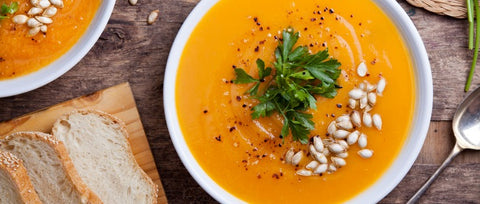7 Reasons to eat more vegetables and less meat

There is a global movement for a lower meat diet. Compassion for animals is one of the reasons people become vegetarians or flexitarians , but many others take the plunge for health and other reasons. So what are the reasons why you should consider reducing your meat intake and increasing your vegetable intake?
- Health Benefits: Eating more vegetables can improve nutrition, help control weight, and reduce the risk of chronic disease.
- Benefits for the environment: meat production is one of the main contributors to global warming.
- Financial benefits: meat is often expensive, reducing consumption can also reduce your food bills.
#1 Nutritional Benefits
The Australian Dietary Guidelines recommend eating five servings of vegetables a day for good health. However, less than one in ten Australian adults actually eat the recommended amount of vegetables each day. The rest of us fill up on other foods like meat, grains, and dairy. While red meat, fish, and poultry provide valuable protein and minerals that the body uses for cell repair, we are still lacking in the vitamins, minerals, and fiber that only vegetables can provide.
What are the health benefits of vegetables?
Vegetables contain some of the highest amounts of vitamins and minerals compared to other types of food. Nutrients found in vegetables and their health benefits include:
- Vitamin C: helps repair minor skin wounds and keeps teeth and gums healthy.
- Iron: essential for red blood cells to transport oxygen in the body.
- Magnesium: Vital for bone health and reducing variations in muscle cramps and high blood pressure.
- Folic acid: essential for women at risk of becoming pregnant, as it reduces the risk of having a baby with a brain or spinal cord abnormality.
- Vitamin A: for eye and skin health and protection against infections.
- Calcium: necessary for the health of bones and teeth and for the normal functioning of muscles, nerves and certain glands.
- Fibers: reduce the risk of coronary heart disease and bowel cancer.
- Potassium: helps maintain ideal blood pressure.
Eating five servings of vegetables for just one week can help you feel more energized by regulating blood sugar levels and increasing vitamins and minerals.
#2. Less weight gain
The average French adult gains 0.62 kg over the whole year. A little more than half of this weight gain (0.32 kg) takes place during the holiday season and we can't put it all down to Santa Claus. The ham, turkey, pork, and chicken we eat for Christmas lunch, and as leftovers a few days later, are responsible for some of the unwanted plumpness we carry around all year.
Switching from meat to veggies throughout the year should help you keep weight off, in theory. The problem is that we don't eat vegetables as such. It's how we prepare vegetables and what we eat them with that adds the kilojoules. It is the sauces au gratin, the cream in the cakes, the butter to mash the vegetables, the oil for roasting and the vinaigrettes on the salads which are the hidden calories. You may think it's okay to eat vegetables, but in some cases you're better off choosing a lean piece of pork over a creamy potato cake.
Eating more vegetables also reduces the risk of resorting to junk food. Keeping chopped carrot and cucumber sticks on your desk at work could keep you from going to the vending machine in the middle of the afternoon.
If you're eating less meat to reduce your risk of weight gain, be careful what you add to your salad or cooked vegetables. Try to eat as many raw vegetables as possible, and when using condiments and other ingredients, check the calories and ingredients on the package. Many salad dressings contain hidden calories in the form of added sugar.
Meat eaters are three times more likely to be obese than vegetarians and nine times more likely than vegans. So it seems that, overall, eating less meat and more vegetables could help you stay slim.

#3 Reduce cholesterol
Saturated fats raise blood cholesterol levels, and the majority of these fats are found in animal meat. A study published in the Journal of the American Heart Association summarized 11 studies conducted around the world to determine whether a vegetarian diet affects cholesterol levels in people with heart disease or with risk factors for heart disease. . Aged 28 to 54, the participants followed a vegan or vegetarian diet, compared to an omnivorous diet consisting of plant and animal products. Researchers found that participants who ate a vegetarian diet lowered their total cholesterol by 13.9 mg, their LDL (bad cholesterol) by 13.1 mg, and their HDL (good cholesterol) by 3.9 mg. The study recommends a vegetarian diet associated with increased physical exercise and reduced obesity. So if you're struggling to control your cholesterol, you might start by eating less meat high in saturated fat.
#4 Improve your skin
The French spend millions of euros each year on skin creams and beauty products, with the aim of having beautiful skin. If only they knew they could eat for a glowing complexion.
A diet rich in omega-3 fatty acids, zinc and vitamin E can improve skin problems such as eczema and psoriasis; it is therefore in your interest to eat fish rather than meat. If you have acne, some dermatologists recommend reducing saturated and hydrogenated fats found in meat, processed foods, and margarine. Selenium-rich foods like tuna, nuts, seeds, and wholemeal bread are better for acne sufferers.
A dermatologist recommends that acne sufferers eat 10 fist-sized servings of vegetables, especially those that are bright or dark in color, as they provide a variety of antioxidants that lessen the damage caused by free radicals and inflammation.
So, cutting back on meat to increase your vegetable intake can help your skin if you have acne or other skin issues.

#5 Reduce the risk of chronic diseases
A lot of research has been done on the health effects of a meat-rich diet. Due to the high amount of saturated fat, overconsumption of meat has been linked to cancer.
The World Health Organization classifies processed meats such as bacon, salami and sausages as Group 1 carcinogens that increase the risk of colon and rectal cancer by 18%. Red meat such as beef, lamb and pork has been classified as group 2A, possibly carcinogenic.
A study conducted in Germany and England found that vegetarians are 40% less likely to develop cancer than meat eaters.
A 2014 Harvard study found that a serving of red meat during adolescence was linked to a 22% higher risk of premenopausal breast cancer. Eating one serving a day as an adult had a 13% higher risk of breast cancer.
Saturated fats have been linked to cancer and cognitive impairment, including Alzheimer's disease and dementia.
#6 It's good for the environment
According to a report by the Food and Agriculture Organization of the United Nations published in 2006, animal production contributes on a "large scale" to global warming, as well as to soil degradation, consumption of water and energy, deforestation and biodiversity loss.
Known as environmental vegetarianism, some people's diets are plant-based in order to reduce their carbon footprint, save water and reduce the amount of land needed to raise animals.
Ruminant animals such as cows, sheep, goats and camels contribute to global warming due to the huge amounts of methane they produce in their intestines and then release into the atmosphere. A dairy cow can produce 200 liters of methane per day, while a sheep produces 30 liters. The total annual emission of methane from livestock is estimated at 100 million tonnes per year, making it the largest source of human-made methane after rice cultivation.
Livestock production requires a massive amount of water. It is estimated that 8% of human water consumption worldwide is used for animal production. Producing one kilo of wheat requires around 1,500 liters of water, while producing one kilo of beef requires ten times as much. Much of this water is used for making animal feed. Vegetable production requires much less water.

#7 Save Money
Buying meat for the evening meal is expensive. For many families, meat is the most expensive part of their grocery bill. If you have visited supermarkets in some European countries, you know that meat is even more expensive there.
By replacing a meat-based main meal with a vegetarian dish, you can shave hundreds of dollars off your annual food budget, and thousands of dollars if you cut out meat altogether.
The Mediterranean diet has long been considered the healthiest. Most people in blue zones, that is, areas where a high percentage of the population lives beyond 100, follow some form of Mediterranean diet. An American research project has proven that it is possible to follow a Mediterranean diet for less cost than the economic dietary recommendations of the United States Department of Agriculture. Using frozen vegetables can significantly reduce costs without compromising nutrient quality.
How to eat more vegetables?
If you're not ready to give up meat but want to increase your vegetable intake, there are plenty of ways to do so.
Vegetable juice: Start your day with a green juice or smoothie filled with vegetables. You may even be able to reach your recommended daily vegetable intake before the morning tea craving has a chance to kick in.
Replace lunch meat with a salad: Experts have been telling us for years that processed deli meats are unhealthy. They may contain carcinogens. If you eat a ham sandwich every day for lunch, try roasted vegetables or salad toppings instead.
Meatless Monday: If you can't bear the thought of giving up meat altogether, replace your Monday evening meal with a vegetarian meal. There are many vegetarian recipes you can try until you find half a dozen that you can alternate.
Winter Soups: Warm up with a vegetable-based soup for lunch or dinner all winter long. With chunky or mashed vegetables, you can't go wrong with a soup.

Can you be partially or totally vegetarian?
The benefits of a vegetarian diet are many, but vegetarianism doesn't have to be an all-or-nothing affair. Some people eat a diet rich in vegetables and avoid certain types of meat, but do not eliminate meat completely.
A pescetarian diet includes fish and other seafood, but no meat.
A pollotarian diet includes chicken, fish, eggs, and dairy products, but no red meat, including all land mammals.
The pollo-pescetarian diet includes poultry, fish and seafood, but no red meat.
Lacto-vegetarians do not eat meat, poultry, fish, or dairy products, but do consume dairy products.
Ovo-vegetarians do not eat meat, poultry, fish or dairy products, but do consume eggs.
The macrobiotic diet is plant-based, but includes an occasional meal of fish or seafood.
Be flexible and see what works for you
As you can see, there are many reasons to eat more vegetables and less meat. If you replace meat products with vegetables, you will increase your intake of vitamins and minerals, which has many health benefits. Swapping meat for vegetables also has financial and environmental benefits. But there's no need to try to become a strict vegetarian overnight. Try to gradually introduce more vegetarian meals into your diet and watch how your body feels about the vegetable intake.
the team of my-peeler-vegetables.fr




